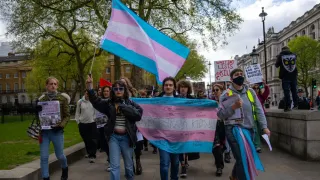
Aug 9
MA Governor Healey Signs Landmark Shield Law Protecting Abortion and Gender-Affirming Care
READ TIME: 3 MIN.
Governor Maura Healey, the first openly lesbian governor of Massachusetts, signed into law a sweeping piece of legislation designed to safeguard both abortion and gender-affirming healthcare for residents and visitors of the Commonwealth. The "Shield Law 2.0," officially titled "An Act Strengthening Health Care Protections in the Commonwealth," arrives at a time when anti-LGBTQ+ and anti-abortion measures are proliferating across the United States, and access to vital healthcare services is increasingly under threat .
The new law introduces several critical protections:
- Anonymity for Providers - Healthcare providers may use their practice name instead of their individual name on prescription labels for reproductive and gender-affirming care, a measure designed to protect their privacy and safety .
- Data Privacy - State and local agencies are prohibited from sharing personally identifiable information or medical records related to abortion or gender-affirming care with entities outside Massachusetts, including federal agencies or other states .
- Emergency Abortion Care - The law codifies the requirement that abortion care must be provided in emergencies when medically necessary, aligning with federal EMTALA standards .
- Protection from Litigation and Discipline - The law ensures providers and lawyers are shielded from professional discipline or hostile litigation related to their provision of reproductive or gender-affirming healthcare .
The Massachusetts House and Senate demonstrated overwhelming support for the Shield Law, with the House passing the bill by a vote of 136 to 23. While opposition was largely concentrated among Republican lawmakers, several moderate and unaffiliated legislators joined Democrats in backing the legislation .
Rebecca Hart Holder, President of Reproductive Equity Now, praised the law’s passage, stating, “Massachusetts will not back down in the face of mounting attacks on abortion access and bodily autonomy. Our Commonwealth is taking bold, meaningful action to further protect patients, providers, and the fundamental rights of everyone seeking care” .
The timing of Massachusetts’ action is especially significant. In recent years, nearly every state except Vermont has seen the introduction of anti-LGBTQ+ bills, with Massachusetts itself facing five such proposals . Across the country, transgender youth are losing access to medically necessary care as hospitals in multiple states—some traditionally considered progressive—have halted gender-affirming services for patients under 19 .
On August 1, 2025, Massachusetts Attorney General Andrea Campbell joined 15 other Attorneys General in filing a lawsuit challenging federal efforts to use criminal and civil enforcement to restrict access to appropriate healthcare for transgender, intersex, and nonbinary youth .
For LGBTQ+ communities, especially transgender, intersex, and nonbinary people, the Shield Law represents a concrete commitment to bodily autonomy and medical privacy. It ensures that both patients and providers are legally protected from the threat of out-of-state litigation and hostile political climates. Advocacy organizations have hailed the law as a model for other states seeking to protect access to care amid intensifying legal and legislative attacks.
The law also builds on prior Massachusetts legislation, such as the ROE Act and the original Shield Law passed in 2022, which were designed to expand and safeguard reproductive and gender-affirming health services .
With Governor Healey’s signature, Massachusetts reasserts its role as a national leader in defending reproductive rights and LGBTQ+ healthcare. Advocates stress, however, that ongoing vigilance is essential: legal challenges, shifting federal policies, and continued hostility in other states mean that the fight for access remains urgent.
The passage of the Shield Law is expected to encourage similar legislative efforts in other states, particularly those seeking to counteract restrictive laws and federal actions targeting reproductive and gender-affirming care. Legal experts note that the law’s provisions—especially those related to data privacy and provider anonymity—could serve as a template for future state-level protections .
For patients and providers in Massachusetts, the law offers immediate and practical assurances: that their medical decisions and practices will be protected from external threats and political interference.
Governor Maura Healey’s enactment of the Shield Law 2.0 marks a pivotal moment for Massachusetts and the broader movement for reproductive justice and LGBTQ+ rights. By embedding comprehensive legal protections for abortion and gender-affirming care, the Commonwealth sends a powerful message of solidarity and resilience to all those seeking affirming healthcare—and to the nation as a whole .






